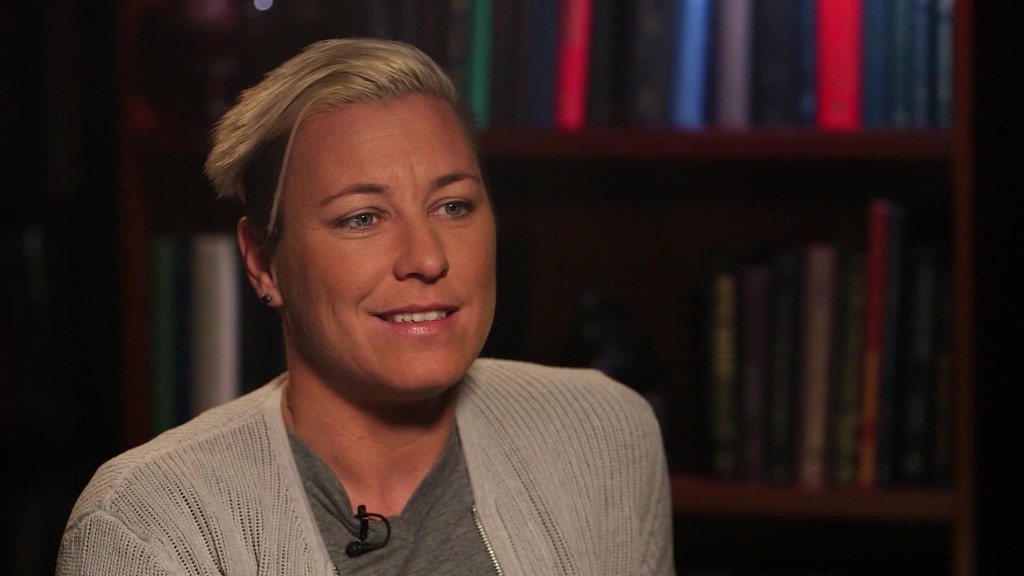
Players on the U.S. women's national soccer team say they are being discriminated against because they are paid less than members of the men's team.
"The women's team does the identical work as the men's team, except they have outperformed in every way," said Jeffrey Kessler, a lawyer who represents the women. "The U.S. Soccer Federation made a profit of $16 million on the women's team last year. It had a loss on men's team."
Kessler said the women filed a complaint Wednesday evening with the Equal Employment Opportunity Commission, the federal agency that enforces equal pay law. It's the first step in what could become a touchstone in the debate about the pay gap between men and women.
The women's team won the World Cup last year and is among the favorites for the Olympics this summer. Its World Cup championship match scored the best U.S. rating ever of any soccer game -- men's or women's. It also drew more viewers than some other top-flight men's sporting events such as the World Series and NBA finals.
Related: Women World Cup champs win waaaaay less money than men
The U.S. men's team finished 11th in its own World Cup competition in 2015.
Kessler said the women are paid between 28% and 62% less than men, depending on the kind of match.
The complaint lays out some compelling numbers. Men earn as much as $17,625 for an exhibition match against a top opponent, according to the court document, and get no less than $5,000 even if the team loses.
But women are paid a maximum of $4,950 even if they win every game. And they're only paid for the first 20 exhibition games they play each year -- they aren't paid anything for any games beyond that. Men get paid for each game, no matter how many exhibition games they play.
And the men's team earned $9 million in the 2014 World Cup for losing in the round of 16, while the women made $2 million when they won the 2015 championship.
"You can argue that based on their success, they're entitled to even higher pay, but the law only requires at least equal pay," Kessler said. "That just makes the case for equal pay all the more compelling."
Related: Record ratings for Women's World Cup finals
The complaint was brought by the five team captains -- Carli Lloyd, Alex Morgan, Megan Rapinoe, Becky Sauerbrunn, and Hope Solo -- on behalf of all members of the women's team.
"They feel strength in their unity," Kessler said.
The women argue their demand is one of basic fairness.
"We have been quite patient over the years with the belief that the Federation would do the right thing and compensate us fairly," said Lloyd.
"Recently, it has become clear that the Federation has no intention of providing us equal pay for equal work," said Rapinoe.
The U.S. Soccer Federation said in a statement that it has supported the development of the women's game for the past 30 years, including pushing for the women's sport to be added to the Olympics in 1996 and to having prize money for the Women's World Cup, which paid nothing to winners prior to 2007. The Federation said it has also supported the creation of the National Women's Soccer League, which started in 2013, after three previous attempts at a women's league had failed.
The Federation said it will deal with the issue of pay with the women players' union in upcoming contract negotiations. The current labor agreement covering national team members expires at the end of this year.
The women's efforts got a vote of support Thursday from Tim Howard, the star goalie of the U.S. men's national soccer team.
"We understand their position. What I would say is if they feel they are unjustly underpaid then without question, absolutely they should be unified and they should fight for their rights," he told CNN Thursday.
Former men's star Landon Donovan tweeted that women should be treated fairly, but added that the pay issue could be addressed in collective bargaining. He said the women's pay should be based on the revenue they produce, not a comparison to the men's team pay.
The EEOC will now investigate the complaint and try to reach an agreement with the soccer federation. If it can't, it can file an enforcement action.
The suit was first reported in the New York Times on Thursday.

